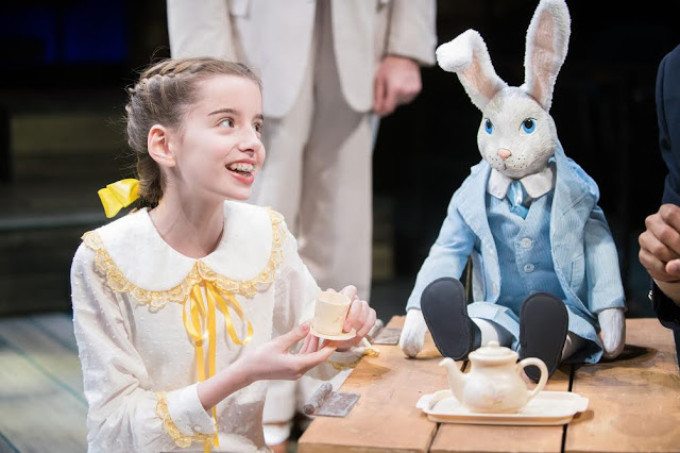Review: Hearts Open Wide for THE MIRACULOUS JOURNEY OF EDWARD TULANE at Milwaukee's First Stage

"If you have no intention of loving or being loved, then the whole journey is pointless," says an antique doll to the weary porcelain rabbit named Edward Tulane. Even on paper, Edward's story sounds enchanting: Can a toy rabbit, swept away on a decades-long journey of joy, loss, fear, and loneliness, truly come to know the miracle of love? First Stage delivers on that enchantment.
Director John Maclay admits in his program notes that this is his favorite kind of play - one "with a tight company of six actors playing two dozen characters while also performing as musicians." The scene is simply set. A piano waits against a wood slat and shingled backdrop as a trio of musicians emerge. The Traveler (the marvelously multi-talented Kat Wodtke) strums her guitar and begins the storytelling. Though Wodtke glides through a handful of bit parts throughout the play, she is the narrator first and foremost.
She tells of 10-year-old Abeline (played by the bright, plucky Bryn Dresselhuys in the Cassiopeia Cast) who has just been gifted a fine, white, porcelain rabbit - handmade in Paris, and named Edward Tulane. "Edward" because he looks quite distinguished, and "Tulane" for the family name. The gift comes from Abeline's rather mysterious Grandmother Pellegrina (the delightful and versatile Karen Estrada), who seems to be able to read the rabbit's thoughts.
Those thoughts manifest in the brilliant Matt Daniels, who dons a dapper suit and hat, follows toy Edward around the stage, and interjects the rabbit's many thoughts throughout the course of his journey. At the onset, though Abeline adores her porcelain friend, Edward is nothing short of a pompous pill - a part that Daniels plays with such insufferable, whiny flair, it's easy to dislike this toy for all his vanity and pride.
But the journey slowly shifts Edward's tone. It starts when Edward is accidentally tossed overboard during an ocean voyage with Abeline. Face-down in the muck at the bottom of the sea for 290 days, Edward learns loneliness. He's rescued by Lawrence the fisherman (Brian Keys), who renames the rabbit "Susanna" and takes him home to wife Nellie (Estrada). Nellie confides in Edward that she and Lawrence once lost a young child to sickness. Edward listens and, as he begins to fill the void in Nellie's heart, learns to care for someone other than himself: "In his listening, his heart opened wide then wider still." Daniels' Edward gracefully navigates this growth.
Edward Tulane does indeed do a miraculous job of engaging a broad spectrum of emotion. Following Estrada's poignant Nellie, Edward finds himself in the hands of a wandering hobo (Keys) and his dog Lucy (Estrada). The canine puppet is an instant delight - a simple stuffed prop that, thanks to Estrada, brings a special kind of joy to the stage. But that joy isn't lasting, as Edward eventually lands in the home of Sarah Ruth, a sick little girl (Dresselhuys), and her brother Bryce (the young Bradley Nowacek). Hats off to these two young performers, who deliver an intimate, affecting scene.
Throughout the play, a large part of the magic lies in the execution. Every choice encourages the imagination, from the simple sets, to the hundred tiny lightbulbs as twinkling (sometimes-mocking) stars, to the playfulness of a small cast taking on role after role. After all, that's what play is for a child: Make-believing they're anyone or anything, stepping into the shoes of the Other, and gleaning something about those others along the way.
Further enhancing the experience, First Stage provides youngsters with educational materials, pre-show questions, and post-show talk-backs - invaluable supplementary tools that spur curiosity and conversation. It's a wholistic approach that nurtures not just a child's art appreciation, but their entire being - their critical thinking skills and even their emotional development and moral compass. Now that's a truly miraculous journey worth taking.
Photo Credit: Paul Ruffolo
Reader Reviews

Videos
